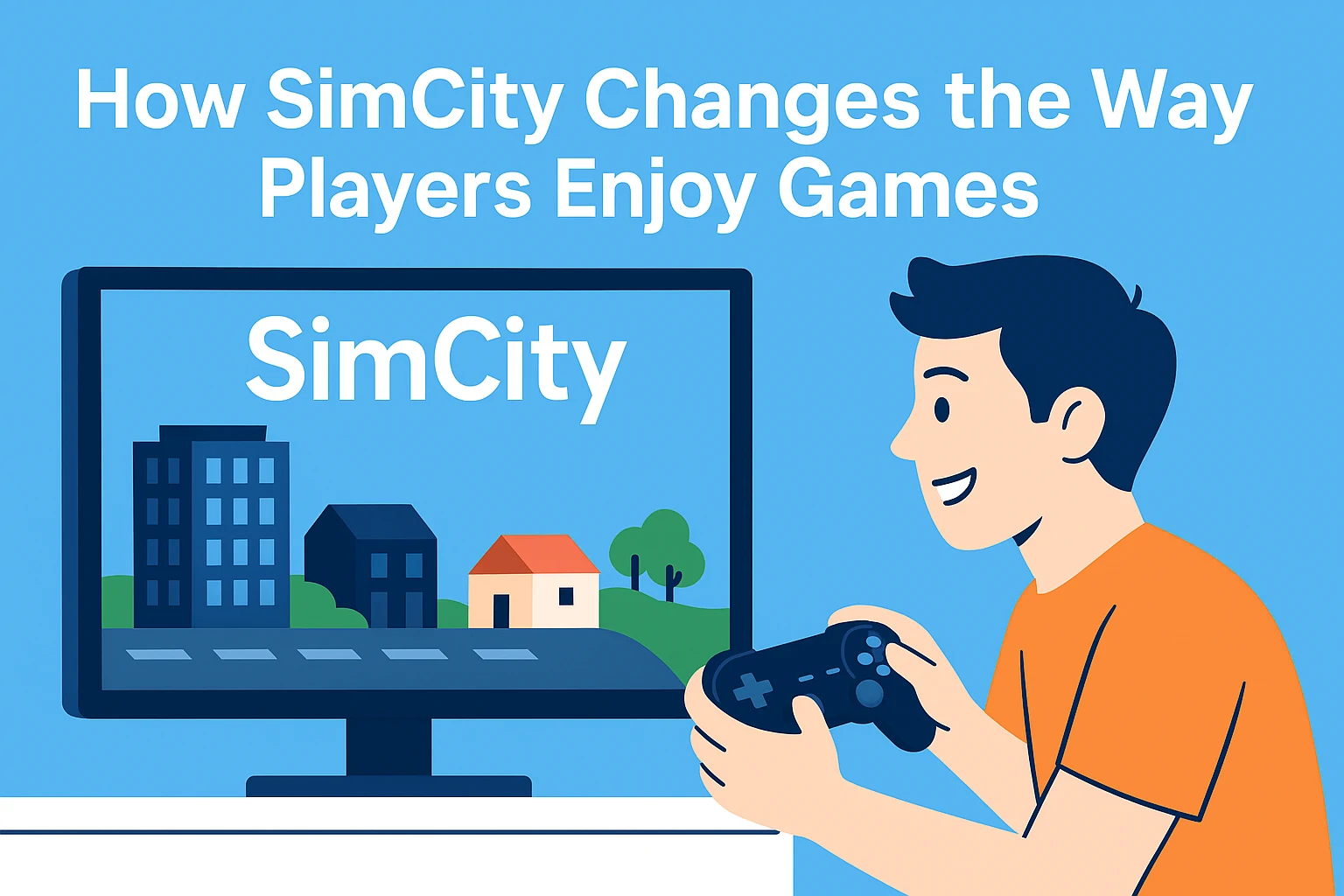Games have always been about fun, skill, and new worlds. Players enter a game to relax, escape stress, or test their abilities. Some games focus on deep stories. Others draw players in with sharp graphics and endless features. Many players enjoy them, yet not everyone wants complexity. Some people want clear paths and easy controls. This is where SimCity makes a difference.
SimCity is not about making games dull. It is about reducing the noise. It takes out the clutter that slows players down. It allows gamers to focus on action, fun, and results. This shift is powerful. It changes how players see games and how long they keep playing.
Gamers today face choice overload. Thousands of titles appear each year. Many come with advanced systems that take weeks to learn. That can feel heavy for casual players. SimCity cuts this burden. It gives players clear tools that help them enjoy the game without stress.
This approach also makes games more open to all kinds of players. Newcomers can step in without fear. Experienced players can focus on skill instead of endless menus. With SimCity, the door to fun opens wider. It changes how games feel and how players interact with them.
What Does Simpciry Mean in Gaming?
SimCity is a design style that favors clarity over clutter. It removes barriers that block fun. Instead of forcing players through long instructions, it offers easy paths. A simple control setup, short menus, and direct goals are part of this style.
This does not mean a game loses depth. Depth can still exist in smart challenges, smart AI, or dynamic maps. The difference is that players do not drown in complex steps before they enjoy play. A game that uses Simpciry gives quick access to action.
Think of mobile games. Most succeed because they are simple. One touch, one swipe, and the game begins. Simpciry works in the same way for larger titles. It is about giving players control without delay.
Why Players Seek SimCity
Many players want fun without stress. Games once felt like a break. They were short escapes after a long day. Over time, some games grew into systems that felt like second jobs. Players had to manage long lists, heavy rules, and constant updates.
This created fatigue. Some stopped playing. Others moved to smaller games. The call for Simpciry rose from this need. Gamers asked for titles that are direct, easy to start, yet rich in rewards.
Simpciry answers this need. It does not make games shallow. It makes them clean. A clean game is one where rules are fair, goals are clear, and the flow feels natural. Players return to such games again and again.
The Role of Design in SimCity
Design drives Simpciry. Good design trims away what does not add value. Menus shrink. Controls line up in ways that feel natural. Players can learn in minutes, not hours.
Visuals also follow this rule. A game with too much detail can confuse the eye. With Simpciry, visuals stay sharp yet easy to read. Important items stand out. Players never guess what matters.
Sound design matters too. Clear cues help guide players. A beep, flash, or short tone can replace long text. This keeps the flow fast. Players stay engaged instead of reading long guides.
Players who enjoy shared fun may also like our full guide on [How to Play 2 Player Games: The Challenge PC 版の遊び方 (Full Guide)].
Simpciry in Classic Games
Classic arcade titles used Simpciry before the word became common. Think of Pac-Man or Tetris. A player did not need a manual. The rules were simple: avoid, chase, or match. Yet the depth was endless. That is pure Simpciry.
Even in early console games, many used simple rules. Jump, run, shoot, or collect. Players learned in seconds. Fun began right away. These titles are still loved today because of their simple style.
Modern developers can learn from these classics. They prove that simple ideas can last for decades. When combined with new tech, they can create timeless experiences.
SimCity in Modern Gaming
Today, many titles bring Simpciry into their design. Indie developers lead the way. They build short, sharp games that focus on clear goals. This draws players who want fast fun.
Mainstream developers also test Simpciry. They know many players avoid complex titles. By adding easy modes or simple menus, they widen their reach. This keeps casual gamers happy without losing hardcore fans.
Platforms also support this shift. Consoles and PCs now offer quick-start features. Players can skip setup and start play within minutes. That is Simpciry in action.
How Simpciry Improves Player Experience
Players enjoy games more when stress is low. Simpciry lowers stress. It cuts out the parts that drain time. Players do not feel lost or stuck. They see progress fast.
This has a direct effect on mood. Fun feels closer. Reward comes quicker. That creates positive loops. Players stay longer, explore more, and share with friends.
Simpciry also improves focus. When controls and visuals are clear, players spend less time learning and more time playing. This boosts skill growth. It also makes victories feel more real.
Social Gaming and SimCity
In social play, SimCity helps groups. Complex rules can slow teams. Simple systems allow everyone to join at once. This is key for online matches.
Friends can invite new players without fear. No one feels left out. The group enjoys a shared rhythm. This builds stronger bonds. Games then become more than play. They become social events.
Communities grow faster around games that use Simpciry. Players make content, share tips, and stay loyal. This adds long life to the title.
Simpciry and Mobile Play
Mobile games thrive on Simpciry. They reach millions because of their ease. One tap can lead to hours of fun. Players play in short breaks or long sessions.
This model proves how strong Simpciry can be. Many mobile hits would fail if they used complex steps. Players would drop them fast.
Developers in all spaces now study mobile methods. They adapt clear controls and simple loops into larger games. This trend shows the future of Simpciry.
The Balance Between Simpciry and Depth
Some fear that Simpciry removes depth. That is not true. Depth comes from challenge, not clutter. A game can stay simple yet offer endless skill growth.
Chess is a prime example. Rules are clear. Moves are simple. Yet depth is infinite. Many games today aim for that model. They want easy rules with deep skill paths.
The balance is key. Too simple may bore players. Too complex may push them away. True Simpciry finds the middle.
SimCity in Gear and Setup
It is not only games that use Simpciry. Gear also follows this path. Players prefer headsets, keyboards, and controllers that are easy to use. Simple gear removes distraction.
Game setup also benefits. Plug and play devices are popular. Cloud gaming services cut the need for heavy installs. This shows how Simpciry spreads across all areas of gaming.
When gear and setup stay simple, players enjoy smoother sessions. No wasted time. No stress. Just play.
Why Developers Embrace Simpciry
Developers see benefits in SimCity too. Games with clean designs reach wider markets. They cost less to support. They face fewer complaints about bugs or broken systems.
This helps studios grow faster. They can focus on fun instead of fixes. They can update without breaking flow. Players reward them with loyalty.
Large studios notice this. They balance their massive titles with small, simple projects. These projects test ideas and keep fans engaged.
How Simpciry Shapes the Future of Games
The future of gaming looks more simple. Players will not accept long waits, complex menus, or endless updates. They want fast fun. They want clear design.
Tech supports this shift. Cloud play, AI tools, and smart devices all work toward quick access. Simpciry will sit at the center of these tools.
As this trend grows, more people will join gaming. Age, skill, or tech level will not matter. Simpciry will make the door open wider than ever before.
Conclusion
SimCity changes the way players enjoy games. It reduces stress, opens doors, and keeps fun close. Players no longer need to spend hours learning rules. They can jump in and feel progress. This makes games more inclusive and more rewarding.
The idea does not mean less depth. It means more focus. With Simpciry, the clutter fades and the joy stands out. Both new and veteran players gain from this shift. Developers also gain as their work reaches more people and lasts longer.
As games evolve, the role of Simpciry will grow. It will shape how titles are built, how players connect, and how fun is shared. The change is already here. Games that use Simpciry are leading the way. The players who embrace it will find a smoother, richer world of play ahead.
Some players prefer group play with simple rules, just like in Best Tabletop Roleplaying Games That Don’t Need a Dungeon Master.
Frequently Asked Questions FAQs
What does SimCity mean for players?
SimCity means games stay clear and easy to use. Players enjoy faster starts, smoother controls, and direct goals without extra stress.
Does Simpciry remove depth from a game?
Depth stays strong even with Simpciry. Challenge comes from smart design, not from complex menus or hard rules.
Why do many gamers prefer Simpciry?
Gamers prefer Simpciry because it saves time. It reduces confusion and allows them to focus on action and rewards.
How does SimCity affect mobile games?
Mobile games rely on SimCity. A simple tap or swipe makes play easy in short breaks or long sessions.
Can Simpciry improve group or social play?
Group play becomes smoother with Simpciry. Clear systems let new and experienced players join without delay.
What future role will SimCity play in gaming?
Future games will depend more on Simpciry. Players expect quick access and clean design, and studios will adapt to meet that demand.
This article is for general information only and does not replace expert advice. Readers should use their own judgment before making gaming choices.




